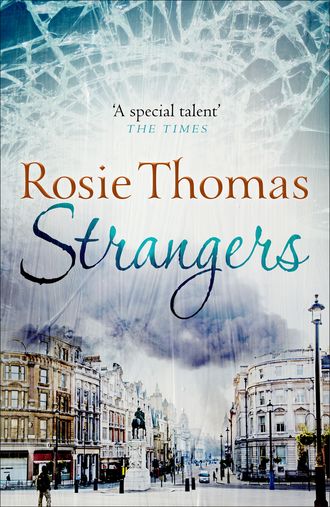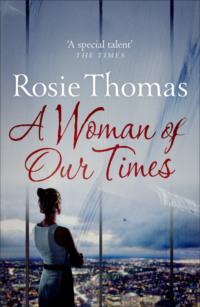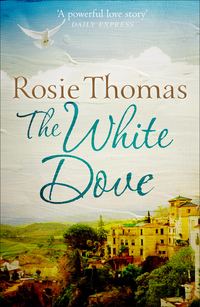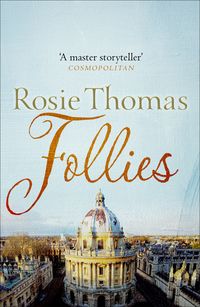
Полная версия
Strangers
‘We will be bringing you more news of that explosion in London’s West End as soon as it reaches us. And now …’
Martin turned away, moving so stiffly that Thomas looked up at him.
‘What’s the matter, Dad?’
He saw Annie’s features printed on the boy’s face and irrational fear gripped him in the stomach.
‘Dad?’
‘I … I’m going out to look for Mummy. I’ll call Audrey and ask her to come and stay with you for a while.’
Even as he said it he knew that he should stay where he was and wait, but he couldn’t suppress his primitive urge to rush to the store and pull at the fallen bricks with his bare hands. He snatched up the telephone and dialled the number. It seemed to take an eternity to explain to Audrey. He stammered over the neutral phrases that wouldn’t frighten the boys yet would bring her, quickly. They stood in front of him, reflecting his anxiety back at him, magnified by their bewilderment.
‘Why?’ Thomas said. ‘She’s only gone shopping, hasn’t she? Why do you have to find her?’
‘I want to bring her home, Tom. I’ll go and get her, you’ll see.’ He had a picture in his mind’s eye of crowded shops with thousands of people milling to and fro, and then the bombed store, silent, as he had seen it on the television. How would he find Annie, in the midst of it all? He made himself smile at the boys. ‘Stay here with Audrey, and we’ll be back soon.’
Benjy’s mouth opened, making a third circle with his round eyes. ‘I want Mummy.’ He was frightened, picking the fear up out of the air. Martin didn’t know how to soothe him while his own anxiety pounded inside him. ‘I want Mummy.’ He began to cry, tears spilling out of his eyes and running down his face.
Martin knelt down and held him. ‘I’m going to get her, Benjy. I told you.’
Through the front window he saw Audrey coming up the path. He straightened up and taking Benjy’s hand he led him to the door. Audrey was wearing an overcoat open over her apron, and Martin saw that she hadn’t stopped to change out of her slippers. They left big, blurred prints in the dusting of powdery snow that lay on the path. Her urgency fanned his fear and he felt his hand tightening over Benjy’s so that the child whimpered and tried to pull away.
Audrey came in, incongruously stamping her slippers on the doormat to knock off the snow.
‘Do you know for sure that she was going down there?’ she asked at once.
‘No. But I think she might have.’
‘You should stay here, you know. Wait for the news. You can’t do anything there.’
‘I know, Audrey, but I can’t sit here. I want to be near, at least.’ She was looking at him, her face creased with sympathy. Martin put on his sheepskin coat, feeling in the pockets for his keys.
‘If … she telephones here,’ Audrey said carefully, ‘I’ll tell her what’s happened and where you’ve gone.’
‘I’ll ring in as soon as I can.’
He was ready now. He hugged the boys in turn, quickly. Benjy had stopped crying and was holding the corner of Audrey’s apron. Tom followed Martin to the door and reached out to him as it opened, the cold air blowing in around them.
‘Is … is Mum in that shop, the one on the TV?’
Martin’s throat felt as if it were closing on the words as he lied, ‘No, she isn’t. But if there are things like that going on today, I think she should come home. Don’t worry.’
He closed the door and left the three of them standing. He ran back over Audrey’s slipper-prints to the gate, and to the car parked in the roadway. Inside was the familiar litter of crumpled papers and discarded toys. Annie used the car mostly, for taking the boys to and fro. The thought came to him: What if she’s dead? and he leant forward over the steering wheel. He heard his own supplication – Please, let her be safe.
Then the engine roared and he swung the wheel sharply, heading the car towards the image of the store that he could see as clearly as he could see the road dipping ahead of him.
The police commander followed his opposite number from the fire brigade down the steps of the control van and across the few yards of pavement to the gaping, shattered windows. In the nearest one, on the corner, a tall Christmas tree made out of some green shiny stuff had been blown sideways. It lay amongst torn screens papered with scarlet satin ribbons. Broken glass lay everywhere, and the commander’s shoes crunched in it as he walked.
They came to what had once been the big doors, and looked upwards. The grey sky showed overhead through the torn ends of girders and ragged floors. Dust still whirled in the air and it blew up in choking gusts behind the firemen as they inched under the tangle of brick and metal.
A young policeman stepped forward and handed the commander a protective helmet. There were two other men waiting. One, a big man in a waterproof jacket, was the borough engineer. He had been called straight out of bed and, under his waterproofs and sweater, he was still in his pyjamas. The other man was grey-faced and his silver hair stood up in unbrushed wings at the sides of his head. He held a helmet in one hand, and as the senior officers approached he put it on with an awkward, unpractised movement. He was one of the directors of the store, and he had arrived ten minutes ago from his home in Hampstead.
‘Our main problem,’ the fire brigade officer was saying, and he gestured upwards as he spoke, ‘is that this portion of the frontage is almost entirely unsupported. There is a real danger that our work underneath will topple it this way.’ He held his arm up to illustrate, flat-handed as if he was directing traffic, and then swung it graphically downwards. Even as they stood there conferring the crooked edifice above them seemed to creak and sway.
‘It will take hours to bring it down from the top,’ the engineer said. ‘Erecting the scaffolding alone will take time. My works people can do it as quickly as is humanly possible, of course, but …’
The unspoken truth was that if there were any survivors underneath, they couldn’t wait that long.
‘Can you go on down as it is?’ the director asked, ‘whilst the work goes on to secure the frontage?’
The policeman and the fireman glanced at each other before the fireman said, ‘Yes. At some risk.’
There was another pause. The policeman waited, touching the corner of his small, clipped moustache with a fingertip. At length he said, ‘Is that the consensus, gentlemen? To continue the rescue operation and to work to make the façade safe, as far as possible, at the same time?’
The three men nodded. ‘Good,’ the policeman said quietly. ‘Thank you.’
They waited side by side, sheltered from the wind by the threatening frontage. A medical team stood a few yards away, huddled together, not speaking. Everyone was watching the black-coated backs of two firemen who were kneeling side by side to lift chunks of masonry away from the lip of a black hollow.
‘Heat camera pinpointed this one. They can see her now. It’s another young girl.’
The commander glanced across at the medical team.
‘Alive?’
‘I’m afraid not.’
The minutes passed. Overhead a crane was being manoeuvred into position to begin the painstaking process of dismantling the toppling store front, piece by piece. The rescue workers in their helmets passed to and fro underneath it, never looking up. The commander waited until the second body was recovered. The girl’s legs looked pitifully thin and white as they lifted her out and laid her on a stretcher. She followed her friend into an ambulance and then away through the cordons towards the hospital.
The commander ducked his head and walked back through the splinters of glass to the trailer. A preliminary report from the bomb squad was waiting for him. It had been a single bomb, sited on the third floor towards the back of the store, probably in a cloakroom. It appeared now that the possibility of another unexploded bomb hidden elsewhere in the store could be discounted.
‘Thank Christ for that, at least,’ the commander murmured. The explosives experts had been at work for an hour. One of them handed him a second report and he glanced quickly at it. Diagrams showed the probable direction of the blast waves following the explosion, and the sliding masses of rubble.
‘Almost exactly the same as at Brighton, sir,’ one of the officers murmured.
‘Except that by a rare stroke of good fortune the PM hadn’t slipped in there for her Christmas shopping.’
‘No, sir.’
According to the calculations, the most hopeful place for survivors in the centre of the store was the basement, sheltered from the falling wreckage by the reinforced thickness of the ground floor. The commander stared through the trailer window at the tangled mountain resting on top of that floor. He put his finger up to his moustache again.
‘Side access to the basement?’ he asked.
‘Almost entirely blocked, sir. They’re working to clear it from both sides now.’
The commander looked down at his watch. It was eleven fifty-five. If there were any survivors in the basement, they had been buried for two hours and thirteen minutes.
Eleven years ago.
Annie wasn’t cold any more. She felt almost comfortable, as if she was drifting in a small boat on a wide, dark lake. Steve’s hand was her anchor.
She was trying to remember what had happened eleven years ago. It was important for herself, but it was more important still because she wanted to tell Steve. She felt him close to her, listening. The sensation of drifting intensified. They were both of them afloat, a long way from the shore.
‘I chose the easy option,’ she said again.
‘And what was it?’ His voice was as warm as if his mouth was against her ear and his fingers tangled in her hair.
‘I chose what would be safe, and simple. Because it would be … wholesome.’ Annie laughed, a cracked note. ‘That’s a funny notion, isn’t it? As if you can turn your life into wholemeal bread.’
Her memory was clear now, the images as vivid as early-morning dreams.
The day she met Matthew was exactly eight weeks before her wedding day. She came up the stairs to the fifth floor of the mansion block where her friend Louise lived. The green-painted stairwell smelt of carbolic soap and metal polish, just as it always did. The lift was out of order, just as it always was and Annie was panting, the John Lewis carrier bag bumping against her leg, as she reached Louise’s door. She rang the bell and when Louise opened the door Annie held the bag up in triumph.
‘I got it. Ten yards, hideously expensive. You’d better like it.’
‘Hmm.’ Louise had taken the bag and peered into it. ‘Oh, yes. I’ll make you a wedding dress such as has never been made before. Annie, this is Matthew.’
He was sitting on the floor with his back against Louise’s sofa and his legs stretched out in jeans with frayed bottoms. He had fair, almost colourless hair cut too short for his thin face, grey eyes, and his bare chest showed under his half-open shirt. He was in his early twenties, two or three years younger than Annie was.
He looked up at her and the first thing he said to her was ‘Don’t marry him, whoever he is. Marry me.’
Annie laughed, slotting him into her category automatically flirtatious, but Matthew hadn’t even smiled. He had just looked at her, and Louise stood awkwardly behind them with the carrier bag dangling in her hand. They didn’t talk about the dress that day. They had tea instead, sitting in a sunlit circle on Louise’s rug.
Matthew had been living in Mexico for a year, working as a labourer on a peasant farm in exchange for his food and a bed in a lean-to shack. He told them about the long days monotonously working the thin soil, the efforts at summer irrigation using water brought on the backs of donkeys from the trickling river.
‘Why were you there?’ Annie asked. The self-conscious hippiedom would have irritated her in anyone else, but Matthew was perfectly matter-of-fact.
‘I was thinking. I’m very bad at it. Can’t do it when there are any distractions.’
‘And why did you come home?’
He grinned at her. ‘I’d finished thinking.’
They went on talking while the sun moved across the rug. Annie realized that it was herself and Matthew talking. Louise was sitting in silence, watching them. At six o’clock Annie stood up to go. Matthew stood up too, and she saw that he was tall and very thin.
‘I’ll come a little way with you,’ he said.
‘I …’
‘I would like to.’
Annie left her bag of wedding dress material on Louise’s floor. When she was standing with Matthew on the pavement outside she remembered that she hadn’t even arranged to come back and look at Louise’s design sketches. She hesitated, wondering whether she should go back upstairs, but a taxi came rumbling down the street and Matthew flagged it down. He opened the door for her and they sat side by side on the slippery seat, looking out at the rush-hour traffic idling in the sun.
‘Where are we going?’
‘To St James’s Park,’ Matthew said. She discovered later that he used his last two pound notes to pay the driver.
It was May, the first day of summer’s warm weather. The grass was dotted with abandoned deckchairs, in secretive pairs and in sociable groups of three or four.
The setting sun slanted obliquely through patterns of curled leaves and glittered on the water. They walked under the trees, talking. It seemed to Annie that this hollow-cheeked boy had simply side-stepped the rituals of acquaintanceship and friendship, and had made her a lover without ever having touched her.
They stopped on the bridge to look down at the ducks drawing fans of ripples in their wake, and their shadows fell superimposed on the water.
Looking at the shape they made, Matthew said, ‘You see? We belong together.’
‘No. I’m going to marry Martin. We’ve known each other for seven years.’
‘That’s no reason for marrying him. Any more than you can dismiss me because you’ve known me for less than seven hours.’
She turned to look at him then, suddenly sombre. He had come to block the wide, smooth road she was walking down and he was pointing his finger down narrow lanes that turned sharply, enticing her. She felt angry with him, and at the same time she wanted to step forward so that their faces could touch.
‘I meant what I said, you know.’ Matthew met her stare. He put his hand out and stroked her hair, their first contact.
‘Do you ask everyone you meet to marry you? Did you ask Louise when she offered to let you sleep on her sofa till you found somewhere else?’
He laughed at her. ‘I’ve never said it before in my life. But when you came into the room, I knew you, Annie. I knew your face, and your walk, and your voice, and I knew what you were going to say.’
She couldn’t contradict him, because she knew it was the truth. Matthew didn’t invent or exaggerate.
‘I don’t know you,’ she said defiantly. ‘I don’t know anything about you.’
He took her arm, drawing it through his and settling it so that her head was against his shoulder. They began to walk again with their backs to the sunset and their shadows pointing ahead of them.
‘I’ll tell you,’ he offered. ‘I’ll tell you whatever you want to know. There isn’t much, so it won’t take too long.’
Matthew was the only son of an industrialist, a self-made tycoon with a newspaper name. The family assumption had always been that Matthew would emulate his dynamic father. But from the day he was old enough to begin to assert himself, Matthew had refused to conform to his father’s requirements. His only interest at school had been woodwork, until he became really good at it – at which point he gave it up for ever. When his school contemporaries were heading for Oxford, Matthew turned his back on them and set out on the hippie trail to Afghanistan. He had supported his travels ever since with menial jobs, working in exchange for food, somewhere to sleep, for enough money to carry him on to the next place.
‘What were you thinking about in Mexico?’ Annie asked him.
‘I was thinking about what I should do. And then I felt the pull to come home, so I came. And here you are.’
‘Don’t you think,’ Annie said, ‘that you might have seized upon me because you think you ought to? That you’re trying to make me someone I’m not, to fill a need in yourself?’
He didn’t hesitate for a second. ‘No. You are the woman I want. You just are. I always knew I would recognize you, and I have. It’s the truth, Annie. You know it too. Admit it.’
‘I suppose you’re going to tell me that we’ve been lovers in some previous life.’
Matthew dropped her arm and stared at her. ‘Certainly not. What d’you think I am? I don’t believe in all that mystical muck.’
They laughed until Annie wiped the tears out of her eyes and rested her forehead against his shoulder, and Matthew put his arms around her, still smiling. It was almost dark, and the cars swished rhythmically along the Mall under the thin glare of the street lights. She waited for him to kiss her. Matthew’s mouth moved against her hair.
‘I’m hungry,’ he said.
So he wasn’t going to kiss her. That made it easier, perhaps.
‘Let’s go and have something to eat.’ Annie moved away a little, regretting the warmth of his arm. ‘There’s a little Italian place in Victoria.’
‘I haven’t got any money,’ Matthew said.
‘My treat,’ she answered lightly.
They began to walk again and he caught her hand. Her ring scraped his fingers and he lifted their clasped hands to peer at it. The stones glinted coldly.
‘Oh dear, diamonds,’ he murmured. ‘I can’t give you any. Will you mind that? Will Martin want this one back?’
She was angry again then, her anger fuelled by a surge of guilt. She pulled her hand out of his and stuffed her clenched fists into the pockets of her jacket.
‘I’m going to marry Martin,’ she repeated. ‘Eight weeks from today. With a ring that matches this one.’
‘Very nice,’ Matthew said icily. They walked over the grass together, silent, both of them angry. But when Matthew spoke again his voice had softened.
‘What are you going to do, Annie?’
She shrugged her shoulders, suddenly bewildered. ‘I don’t know. Some thinking, like you. I just don’t know.’
‘I can wait,’ Matthew told her, and she knew that he would.
It wasn’t a double life, exactly. Half of it was a dream-world, and the other half was briskly real. She went to Louise’s several times, and stood for hours having the dress pinned on her. The invitations came from the printers and she went through the lists with her mother, and then addressed and stamped the dozens of envelopes. She spent weekends with Martin in the flat they had bought, painting the window frames and helping him to put up cupboards in the kitchen. And whenever she could she ran away to be with Matthew.
He drew her into his world, and she discovered with a kind of fascinated fear that Matthew existed without any constraints at all. He didn’t live anywhere. He drifted from a borrowed bedsitter to someone else’s sofa, and from there to an empty room over a shop where he slept on a blanket spread on the floor.
There was plenty of casual work in those days. He washed up in a café, and then spent a week labouring for a builder. He lived in the room over the shop because he was building display cabinets downstairs for the owner.
He never made plans, and he never worried about what might happen to him tomorrow. And so, Annie thought, he could give all his energy to enjoying whatever came. It was the quality of Matthew’s enjoyment that she loved. Afterwards, she thought that the hours she spent with him were the happiest of her life.
When he had money, he spent it without thinking. He loved good food, and he would dig out his one presentable outfit and take her to grand restaurants where he insisted on spending almost a whole week’s wages on a single meal. He derived such pleasure from the plush surroundings and the procession of exotic dishes that Annie couldn’t refuse to go, or even persuade him to let her pay her share.
‘You must know that it’s only any fun,’ Matthew said, ‘if you can’t afford to do it. My father eats lunch in places like this every day of his life, and all he ever wants is grilled sole and mineral water.’
When there was no money, Matthew was endlessly ingenious at finding free pleasures.
In his company Annie discovered tiny parks that she had never known existed, and she saw more pictures and sculptures and Wren churches than she had done in all her time as an art student. It didn’t even matter what they did, particularly. As long as she had an hour or two to spend with him, Matthew was happy. He seemed to want nothing more than her company and their activities, whether they were free or costly, were simply an extra, pleasurable bonus. When she was married and thought back to the benches beside the river and the faintly stuffy smell of the National Gallery, the elaborate dinners and the sudden taxis, she wondered if the times with Matthew were the last in her life when she had felt young.
He made her feel other things, too. They made love for the first time in the room over the shop. Annie had come straight from work. It was a warm evening at the beginning of June and she was wearing a sleeveless blue cotton dress. Her hair crackled with electricity over her shoulders, and when Matthew opened the door he reached out and put his hand underneath the thickness of it, his fingers stroking her neck.
After the first evening in St James’s Park, he had kissed her once or twice, lightly, almost jokingly. She had convinced herself that she was relieved that there was no more to it, and that she wasn’t betraying Martin in any way. But she had also known that Matthew was simply waiting, according to some system of his own, for the right time.
He took her hand and led her across the bare floorboards to the grey blanket with a single sleeping bag spread out on top of it. Annie saw an electric kettle, the neat tin box where Matthew kept his minimal supplies of food, his spare clothes folded tidily in an open suitcase. He stood behind her, lifting her hair and bending down to kiss the nape of her neck. He undid the buttons at the back of her dress and drew her against him, his hands over her breasts.
‘Here?’ Annie asked. She looked at the uncurtained windows with the sun lighting up the coating of grime and throwing elongated golden squares on the floor. She could feel Matthew’s smile curling against her neck.
‘My layers of dust are as effective as your net curtains.’
‘I don’t have net curtains.’
‘I expect your mother does.’
Her dress dropped to the floor and they stepped sideways, away from it, glued together. With the tip of his tongue, Matthew drew a line from the nape of her neck to the hollow at the base of her spine. Then, with his hands on the points of her hips, he turned her round to face him. Annie thought that she could see the sunlight shining straight through the taut skin over his cheekbones. Her hands were shaking but she reached out and unbuttoned his shirt, her movements echoing his. Then she looked at the shape of him, seeing the pale skin reddened from his labouring job, the bones arching at the base of his throat and the hollows behind them. She closed her eyes, and his mouth touched hers.
‘You see? It doesn’t matter where,’ Matthew said. He took her hand and led her to the blanket, and they lay down together.
It was the most perfectly erotic experience she had ever had. Matthew moved unhurriedly, almost dreamily, and he kissed the thin skin between her fingers, and each of her toes, and then the arches of her feet. He was so slow that she felt he was torturing her, but when at last he came inside her it was so quick and powerful that she heard herself cry out, as she had never done before. When at last they lay still, with Matthew’s arms around her and her head on his shoulder, she said softly, ‘I thought it only happened like that in films, and books.’









